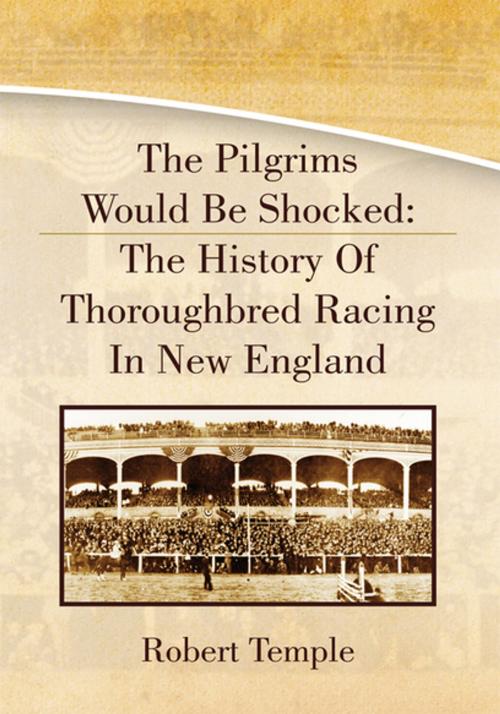The Pilgrims Would Be Shocked: the History of Thoroughbred Racing in New England
Nonfiction, Sports, Horse Sports, Horse Racing| Author: | Robert Temple | ISBN: | 9781462810734 |
| Publisher: | Xlibris US | Publication: | March 24, 2009 |
| Imprint: | Xlibris US | Language: | English |
| Author: | Robert Temple |
| ISBN: | 9781462810734 |
| Publisher: | Xlibris US |
| Publication: | March 24, 2009 |
| Imprint: | Xlibris US |
| Language: | English |
For 40 years the most attended sport in New England was thoroughbred racing. Since1933 when pari-mutuel racing was legalized in the region after 300 years of puritanical opposition there were 16 tracks in operation in five New England states. Today there is only one track left and its barely surviving. The Pilgrims Would be Shocked: The History Of Thoroughbred Racing In New England traces the rise and near fall of the sport, beginning with its puritanical background when people were put in the stocks and fined by the Pilgrims for merely racing horses, with or without wagering. Finally, in 1906, a meet was run at Rockingham Park in Salem, New Hampshire which was financed by John Bet A Million Gates. His million dollar bet proved to be a loser as the track was quickly closed down by authorities because of gambling at the facility. Wagering had not been legalized by the state legislature and church leaders and others demanded it be stopped. In 1933, Lou Smith, an amazing immigrant son of impoverished Russian parents, came to the Granite State and, through his power of persuasion and political savvy, convinced the legislature during the hard economic times of the Depression to legalize pari-mutuel racing. The enabling legislation was passed and the first race meeting was an unqualified artistic and financial success, producing top quality racing, high employment and significant revenue to Salem and the state of New Hampshire. Seeing the tremendous success of New Hampshire, Rhode Island legalized the sport in 1934 and Massachusetts in 1935. The tracks produced significant tax revenues and employment for these states as well. For the next four decades the greatest horses (including three Triple Crown winner), jockeys, owners and trainers competed throughout New England, producing the highest caliber of racing. There was no shortage of incredible occurrences during that time, including the closing of Narragansett Park by the National Guard on orders of the Rhode Island governor, and a man who ran out in front of the horses at the finish of a stakes race at Suffolk Downs in East Boston. Beginning in the late 1970s the sport began its decline for a number of reasons. This book analyzes the factors contributing to its fall in popularity and possible solution to saving it from extinction.
For 40 years the most attended sport in New England was thoroughbred racing. Since1933 when pari-mutuel racing was legalized in the region after 300 years of puritanical opposition there were 16 tracks in operation in five New England states. Today there is only one track left and its barely surviving. The Pilgrims Would be Shocked: The History Of Thoroughbred Racing In New England traces the rise and near fall of the sport, beginning with its puritanical background when people were put in the stocks and fined by the Pilgrims for merely racing horses, with or without wagering. Finally, in 1906, a meet was run at Rockingham Park in Salem, New Hampshire which was financed by John Bet A Million Gates. His million dollar bet proved to be a loser as the track was quickly closed down by authorities because of gambling at the facility. Wagering had not been legalized by the state legislature and church leaders and others demanded it be stopped. In 1933, Lou Smith, an amazing immigrant son of impoverished Russian parents, came to the Granite State and, through his power of persuasion and political savvy, convinced the legislature during the hard economic times of the Depression to legalize pari-mutuel racing. The enabling legislation was passed and the first race meeting was an unqualified artistic and financial success, producing top quality racing, high employment and significant revenue to Salem and the state of New Hampshire. Seeing the tremendous success of New Hampshire, Rhode Island legalized the sport in 1934 and Massachusetts in 1935. The tracks produced significant tax revenues and employment for these states as well. For the next four decades the greatest horses (including three Triple Crown winner), jockeys, owners and trainers competed throughout New England, producing the highest caliber of racing. There was no shortage of incredible occurrences during that time, including the closing of Narragansett Park by the National Guard on orders of the Rhode Island governor, and a man who ran out in front of the horses at the finish of a stakes race at Suffolk Downs in East Boston. Beginning in the late 1970s the sport began its decline for a number of reasons. This book analyzes the factors contributing to its fall in popularity and possible solution to saving it from extinction.















